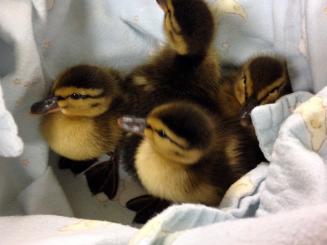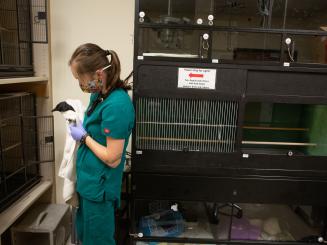Wildlife Program
Good Samaritans and first responders bring thousands of injured or ill wild animals to DoveLewis every year in need of medical attention. With generous donations from local animal lovers, DoveLewis’ team stabilizes the animals and the Bird Alliance of Oregon supports their recovery and release
About the Wildlife Program
Our wildlife program provides a safe haven and stabilizing medical care to injured and sick wild animals, ensuring they get the help they deserve. Support our wildlife program today to be their lifeline.
If you have found a bird in need of medical care, the best chance for their recovery and release is at a rehabilitation center. DoveLewis is not a rehabilitation center.
DoveLewis can accept ill or injured wild animals outside of the Bird Alliance of Oregon’s Wildlife Care Center’s intake hours (8 a.m. – 5 p.m. daily).
Learn More + Find Resources from the BAO
Local Rehabilitation Centers
- Wildlife Center of North Coast in Astoria
- Cascades Raptor Center in Eugene
- Chintimini Wildlife Center in Corvallis
What to do if you find a wild animal.
- Call the experts. If you find a wild animal, call the following centers:
- Wildlife Center of North Coast in Astoria
- Cascades Raptor Center in Eugene
- Chintimini Wildlife Center in Corvallis
- If you come across a sick or injured animal in the evening or on the weekends, call DoveLewis for next steps. Factors such as staff capacity and the current avian influenza can impact which animals are able to be cared for. It is illegal to attempt to rehabilitate a wild animal on your own.
- Limit your contact with the animal. Wild animals are terrified of humans. Limit your contact to only what is needed to contain the animal if it is recommended to be transported. This will reduce the amount of stress on the animal.
- Safely contain the animal.
- If the animal is obviously injured or ill and can be transported safely, find a towel, blanket, or thick gloves to use while handling the animal.
- Place the animal in any available safe container – a carrier or ventilated box is ideal.
- Make sure the animal is as comfortable as possible and secure in the container.
- Many animals, especially small ones, are stunned and will fly or scurry away when they become more alert.
- Do not give the animal food or water. If their bodies are shutting down or if they are very weak, metabolizing food could kill them. Administering water can be dangerous because it is easy to aspirate the animal.
What to Do if You Find a Baby Bird
It can be scary to see a baby bird away from its nest, but depending on its age and species, the ground might be the best place for it. You might be asked to return the bird to where you found it, place it in its nest, or even build a makeshift nest.
Help Birds Avoid Colliding with Windows
According to Portland Audubon, nearly 1 billion birds die every year in the US by colliding with a window. What can you do at your home and office to minimize the risk to local birds?
What to Do if You Find a Baby Mammal.
Parents of young mammals, such as rabbits and fawns, will often leave their young alone for long stretches of the day or night. Learn more about what to do if you have found a young mammal.


